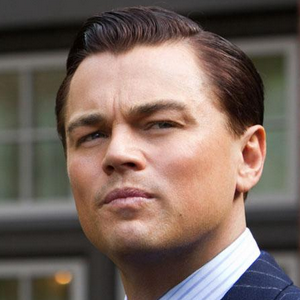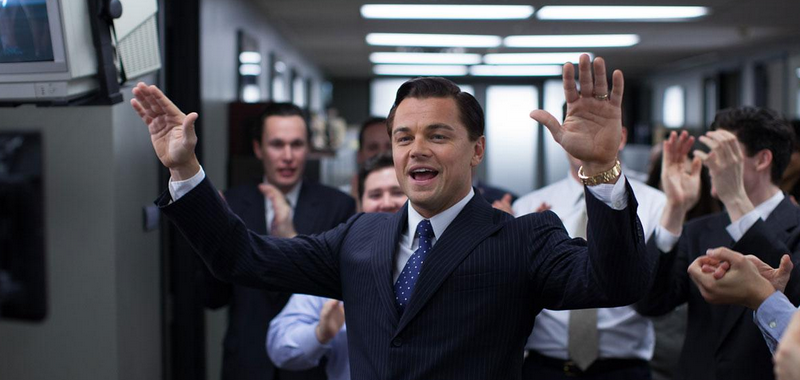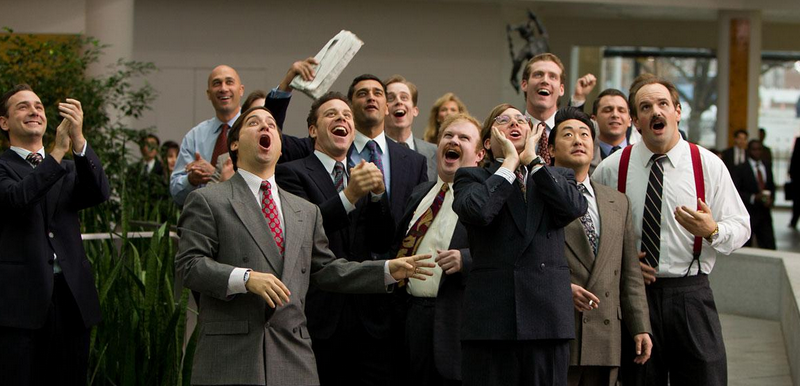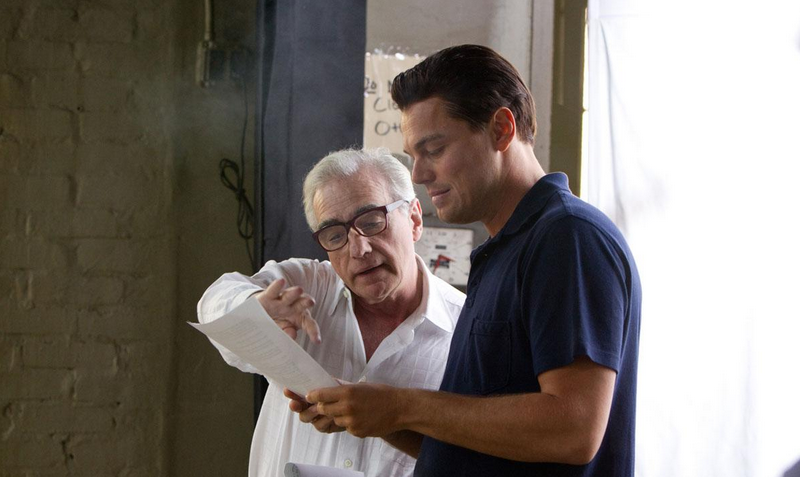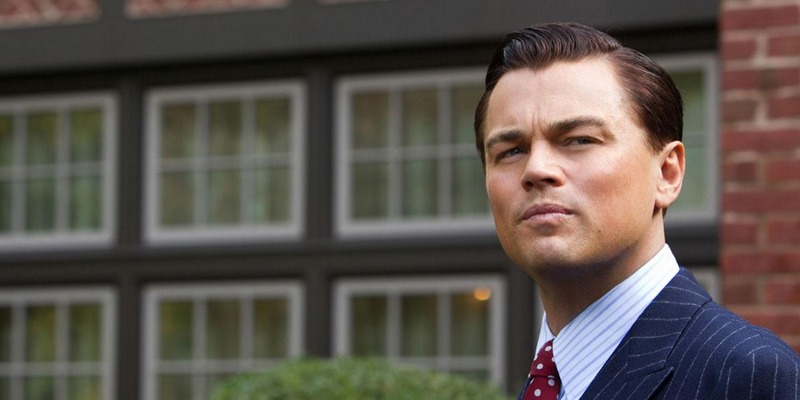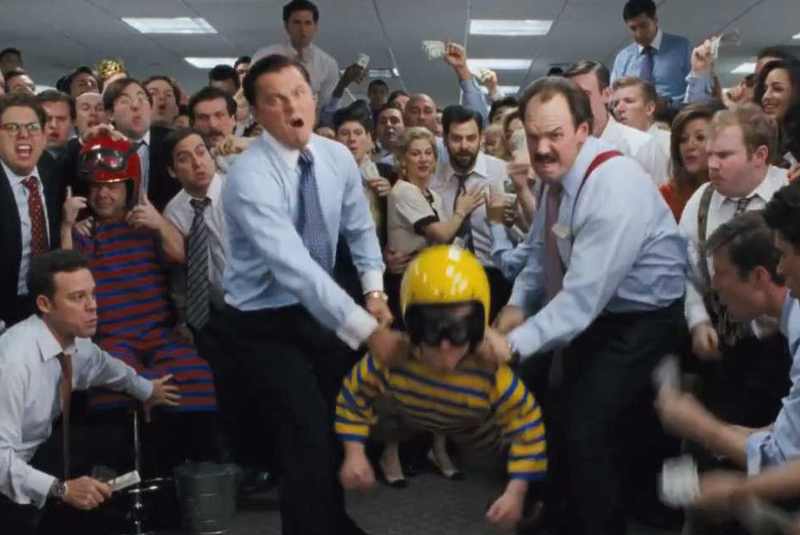The Wolf of Wall Street Review
No surprise that Martin Scorsese’s “The Wolf of Wall Street” completes a riveting triptych of films that explore male tribal psychology and criminal behaviour. Scorsese’s earlier films delve deeply into the troubled psyche of its individual protagonists but with “Goodfellas” and “Gangs of New York” in particular, Scorsese found a new interest in how that very same individual does or doesn’t fit in, creates his own code of conduct, leads or follows the tribe. Scorsese has plenty of good help with this one, starting with real life protagonist Jordan Belfort. Founder of Stratton Oakmont, which at its height employed over 1,000 stock brokers, Belfort was arrested by the FBI on numerous counts of stock fraud.
Terence Winter (The Sopranos, Boardwalk Empire) as screenwriter has his mitts all over this one. The collaboration with Martin Scorsese on the big screen bears fruit for both of them. The writing, whether hyperbolized or not (some of Belfort’s accomplices have accused the filmmakers of gross exaggeration), the language of the huckster/con man, not unlike the ‘mob-speak’ in “Goodfellas”, conjures up the very grey and idiosyncratic underside of Wall Street trading, its bad-apple fraudulent traders with their crass peccadilloes. And this is not just about financial fraud but a deep existential fraud — Belfort’s life is a huge lie and the audience is spared none of its consequence: he loses everything, his wives, his kids, his ill gained wealth and his once cherished and loyal friends.
Winter’s script goes all the way and in the end there is no rationalizing or resolution, not even a satisfying retribution. We even see Belfort’s captor Kyle Chandler (Patrick Denham) ride home on a miserable cross town subway, as predicted by Belfort, wondering whether his moral fortitude as a stand-up cop is even worth it. Scorsese’s camera matches the language of this world in his inimitable way, shot with a heightened sense of urgency and pace and with remarkable epic detail. There is very little left to the imagination but you don’t feel any of the film’s length.
Comic relief is abundant as the characters, particularly Donnie Azoff (Jonah Hill) as Belfort’s right hand man, unfold their ridiculous and disproportionate ambitions matched by their equally ridiculous and abusive characters. We find ourselves laughing at the con because we almost admire the sheer audacity of it all. This is “Catch Me if You Can” on steroids, but there is no charm in the end here, just pathetic lost souls on a wild ride to nowhere leaving ruined lives in their wake.
Scorsese has always given us a very catholic substrate in his films. Jake La Motta (Robert de Niro) in “Raging Bull” was motivated by jealousy and rage, Travis Bickle (also De Niro) in “Taxi Driver” by rage and retribution, Henry Hill (Ray Liotta) in “Goodfellas” by fear of being a nobody and Tommy DeVito (Joe Pesci) in “Goodfellas” a psychotic fuelled by insecurity, Vallon Amsterdam (Leonardo Di Caprio) in “Gangs if New York” by impoverished circumstance and pride. The ‘Wolf’ is surely driven by greed but there is also a complex set of motivations at play that belie easy understanding. Terence Winter’s contribution may be the facile Greek-like depiction of our most base instincts when empowered to spin out of control, just laying bare the consequence of excess, particularly when it is enabled by a flawed system to match its flawed participants.
The principal on which every successful con is based is in full play. Jordan Belfort (Leonardo Di Caprio) could only be possible in all his moral degradation along with a wide cast of accomplices and thousands of suckers to prey on, who are equally driven by the same quick buck — outlandish commissions for penny stock investment coupled with the equally outrageous returns for investors when the stock repeatedly doubles, all based on a con, on unacknowledged lies. And when the shit hits the fan, there are people at the end of the lie who pay for it all — one huge Ponzi scheme that somehow regulators saw fit to overlook because it was all traded off the main track. Fertile ground for Martin Scorsese to relish for almost 3 hours with the opportunity to explore the moral ambiguity and excess of male tribal behaviour on Wall Street.
Matthew McConaughey’s priceless cameo as ‘Mark Hana’ sets the tone for Belfort’s transformation from earnest broker to cynical huckster and con man. Every law of the jungle applies, chest beating anthem included to call out and perversely celebrate the privileged application of the tribes most basic instinct for success: the con. This is a world where the fittest don’t necessarily survive, but rather where those who have dissuaded their hearts and souls of any moral fibre or sensitivity do. Enabled by copious amounts of cocaine, quaaludes and alcohol to energetically fuck their clients collectively out of billions, they then proliferate obscenities, sexual exploits and circus acts (in this instance dwarf throwing) to mark and measure their success. Scorsese wants to plunge us into this world without any reservation to reveal not only the dehumanizing results, but also how easily the tribes of Wall Street operated in their insular and surreal worlds. As Belfort points out with eager disdain, Wall Street manufactures nothing. “Was it legal?”, he asks. “Absolutely not”.
In Goodfellas the premise for the mob tribe was to operate without pretence of legality but to honour a code of secrecy and loyalty to one’s family. If you stole something, you did it discreetly, you lived discreetly and you respected your tribe by paying off a ‘vig’ to your elders on every score. In Casino, Scorcese upped the ante to not only include the greed for money but also legitimacy: casino gambling lent itself to mob tribal values while providing the airs of a legalized business. But just as the admirable quality of trust and honour is found in bringing the singularly purposed tribe together, when they go sideways, an individual tribe member in each and every case breaks the code, either beating his accomplices to death or near death or ‘ratting out’ other so called loyal friends in exchange for protection, reduced jail time or just a plain larger cut of the proceeds of their theft. Honour and trust only go as far as it pays.
“The Wolf of Wall Street” is no different and profoundly distinguishes itself in this tribal psychology because the ‘wolf’ and his accomplices are enabled just as much by a peculiar reciprocity in the financial system as they are by lack of a moral compass.
Sobering to think that Wall Street in its illustrious history has displayed very little hubris in general. Rules are changed to prevent transgressions like Belfort’s but new ways to abuse the system are repeatedly found and practiced. The Wolf of Wall Street reminds us that many a flock of sheep remain vulnerable and with numbing stupidity enable their silver tonged predators by chasing the very same almighty quick buck. As the dollar bill so ironically pledges, “in god we trust” but when its handled by your broker, ‘caveat emptor’.
Alfredo Romano
